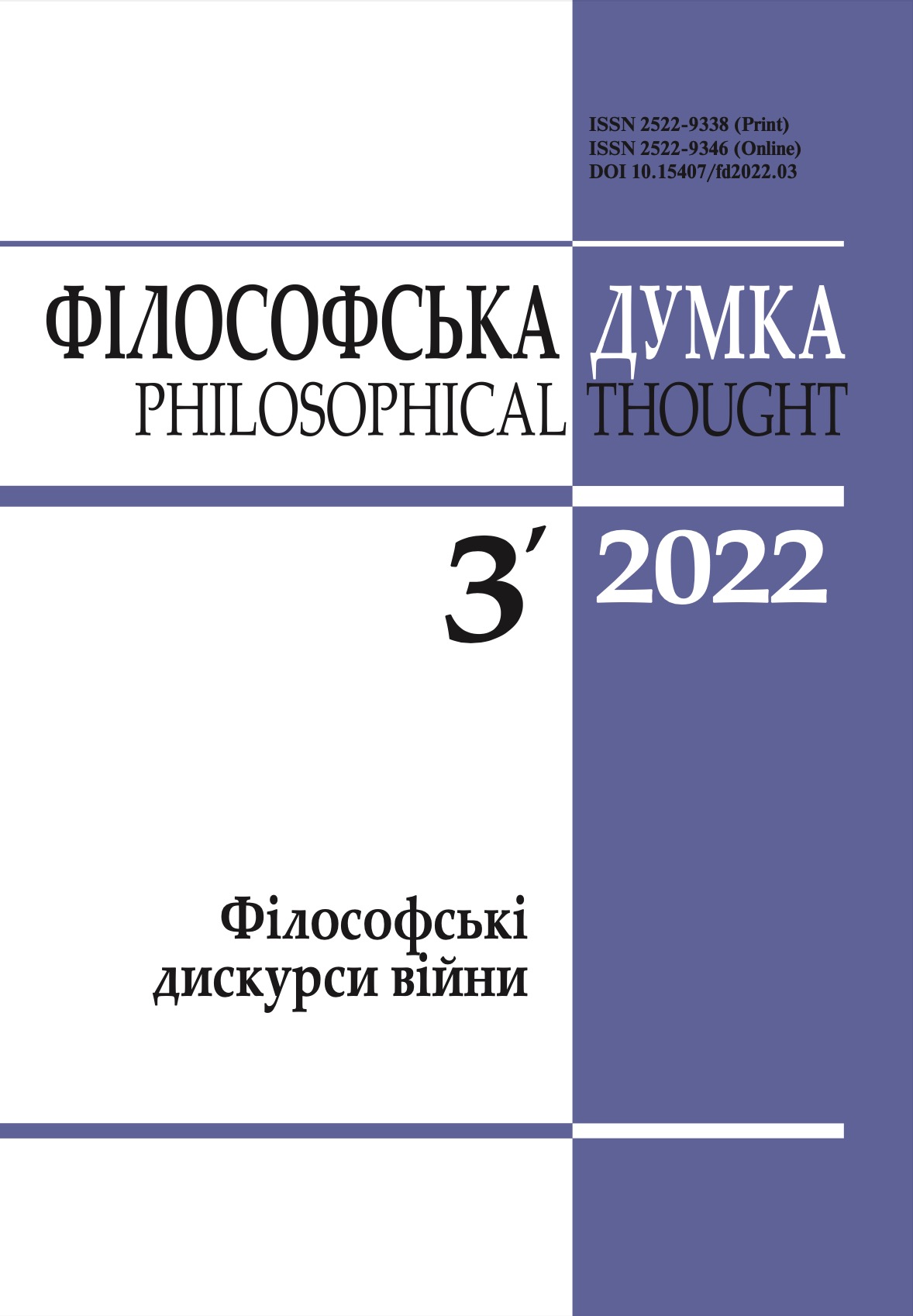THE LONG TWENTIETH CENTURY?
DOI:
https://doi.org/10.15407/fd2022.03.083Keywords:
war, politics, modern political philosophy, extrapolitical conflict, russian-ukrainian war, century of total warAbstract
The paper describes the historical and intellectual foundations on which the European political system was built after the Second World War; this system pursued the goal to prevent any war in Europe, but proved unable to prevent the russian-Ukrainian war. The paper shows that this system was built not only because of the trauma of the First and Second World Wars, but also in accord- ance with the liberal attitude to war, which M. Vatter called «war with “war”»; at the same time, such a clear attitude does not refer to real wars, but to an imaginary «war of all against all». Based on the analysis of the principles and results of the research project “War and Society” under the direction of J. Baechler, the author outlines the principles of liberal Realpolitik as the implementation of the mentioned attitude in the realm of wars: it consists in their rationalization both at the level of goals and at the level of means of warfare; such a rationalization finally makes war irrational and unacceptable. From the point of view of such Realpolitik, war is only an extraor- dinary means of politics, and the russian-Ukrainian war is only an excess of violence, while in the opinion of the author, it is an inevitable consequence of the irrational and violent russian-Ukrainian extrapolitical conflict, whose stakes is the existence self of Ukraine. The author believes that one of the reasons for the inability of the European political system to prevent the russian-Ukrainian war is the belief that with the end of the Cold War, the “century of total war” in Europe also ended, and that the economic and cultural integration of post-communist countries into the European space makes such conflicts impossible. The author refers to the description of the own logic of wars of the 20th century, proposed in R. Aron’s book «The century of total war», and suggests considering the russian-Ukrainian war as a continuation of these wars. In the perspective pro- posed by R. Aron, the mentioned «century of total war» can be considered as a «long 20th century», which continues to this day.
References
Aron, R. (1951). Les guerres en chaîne. Paris : Gallimard.
Baechler, J. (2014). I. La guerre comme concept. Dans : Baechler, J., éd. Guerre et Politique (pp. 13—26). Paris : Hermann. doi :10.3917/herm.baech.2014.01.0013
Baechler, J. (2016). Conclusions. La guerre et l’irrationnel. Dans : Vissière, L., & Trévisi, M., éds. Le feu et la folie : L’irrationnel et la guerre (fin du Moyen Âge — 1920). Presses universitaires de Rennes. doi :10.4000/books.pur.46237
Baechler, J. (2019). I. La centralité de la guerre. Dans : Baechler, J., éd. Guerre et Histoire (pp. 5—29). Paris: Hermann. doi :10.3917/herm.baech.2019.01.0005
Buhot de Launay, M. (2001). «Professorenkriegsliteratur». Revue de métaphysique et de morale, 31, 365—382. doi :10.3917/rmm.013.0365
Ern, V.F. (1991a). From Kant to Krupp. In: Ern, V.F. Works. (pp. 308—318). Moscow: Pravda Publishing House.
Ern, V.F. (1991b). The essence of German phenomenalism. In: Ern, V.F. Works. (pp. 319—328). Moscow: Pravda Publishing House.
Hobbs, T. (2000). Leviathan. (Translated from English). Kyiv, Spirit and Letter.
Holeindre, J.-V. (2014). Ce que la guerre fait aux sociétés. Dans : Holeindre, J.-V., éd. La guerre: Des origines à nos jours (pp. 5—12). Auxerre: Éditions Sciences Humaines. doi :10.3917/ sh.testo.2014.01.0005
Rocard, M. (2018). L’édit de Nantes ou l’art de la paix de compromis [1997]. Dans : Thuderoz, C., éd. Politique du compromis (pp. 265—284). Bruxelles: Éditions Larcier.
Rousseau, J.-J. (2018a). The last answer by J.-J. Rousseau from Geneva. In: Rousseau, J.-J. Selected treatises. (Translated from French by O. Yosypenko, S. Yosypenko, O. Khoma). (pp. 109—134). Kharkiv: Folio.
Rousseau, J.-J. (2018b). Discourse on the origin and basis of inequality between people. In: Rousseau, J.-J. Selected treatises. (Translated from French by O. Yosypenko, S. Yosypenko, O. Khoma). (pp. 147—255). Kharkiv: Folio.
Vatter, M. (2002). La politique comme guerre : Formule pour une démocratie radicale ?. Multitudes, 9, 101—115. doi :10.3917/mult.009.0101
Yermolenko, A., Wieviorka, M. & al. (2019). Violence as a phenomenon of the modern world: social and cultural-historical dimensions: The “Philosophical Though” Round Table. Filosofska Dumka, (2), 6–69
Downloads
-
PDF (Українська)
Downloads: 397
Published
How to Cite
Issue
Section
License
Authors who publish with this journal agree to the following terms:
- Authors retain copyright and grant the journal right of first publication.
- Authors are able to enter into separate, additional contractual arrangements for the non-exclusive distribution of the journal's published version of the work (e.g., post it to an institutional repository or publish it in a book), with an acknowledgement of its initial publication in this journal.
- Authors are permitted and encouraged to post their work online (e.g., in institutional repositories or on their website) prior to and during the submission process, as it can lead to productive exchanges, as well as earlier and greater citation of published work (See The Effect of Open Access).


